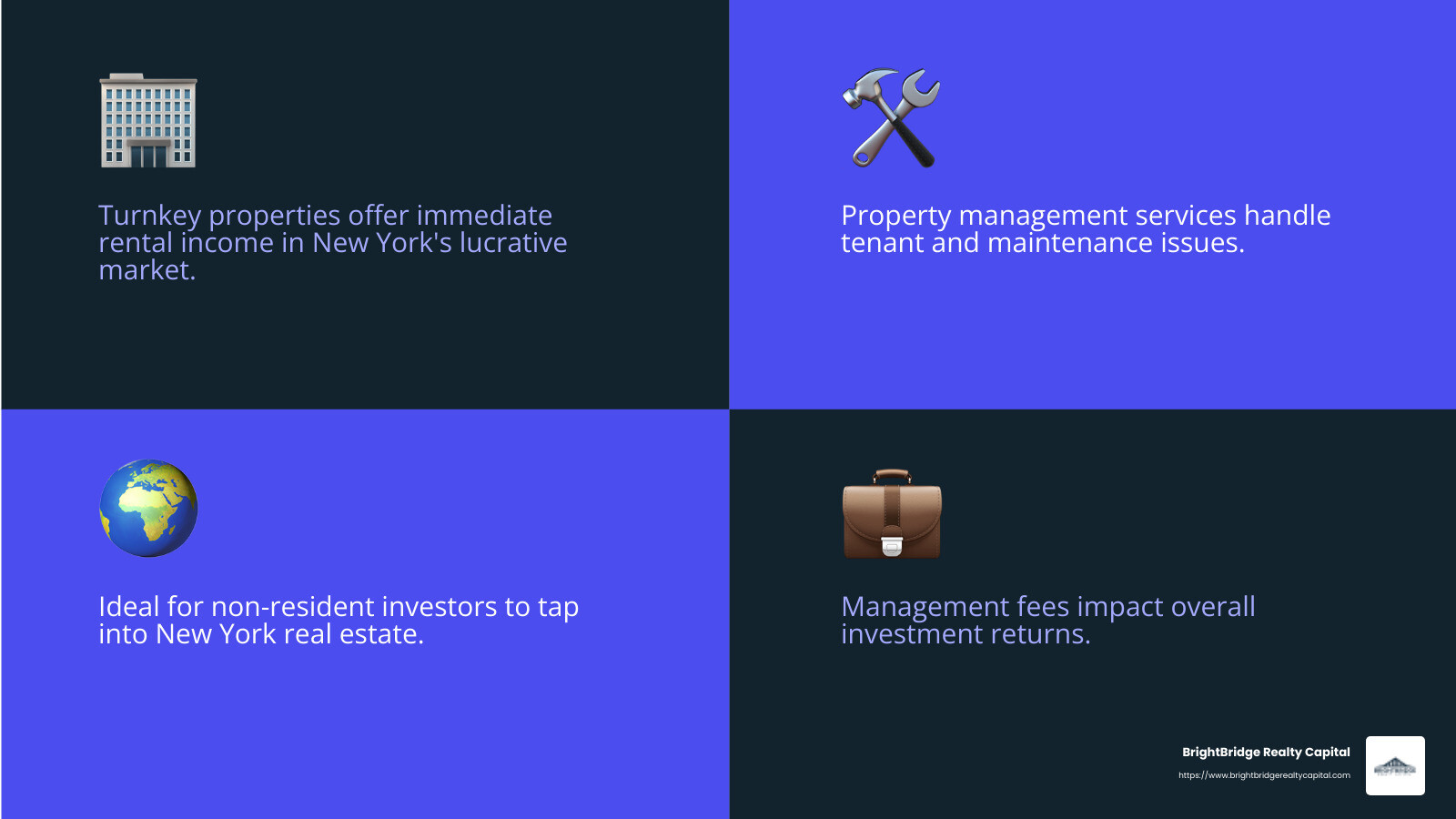Concrete Jungle: Exploring New York Real Estate Investment Opportunities

New York real estate investment is a topic that captures the imagination of many investors around the world. As one of the most dynamic cities on the planet, New York City offers a vast array of investment opportunities, making its real estate market both enticing and complex. Here's a quick overview to understand its appeal:
- Expensive yet promising: New York City is known for its high property prices. However, these costs reflect the city's best demand, making real estate investments here potentially lucrative.
- Diverse options: Investment avenues range from turnkey properties for immediate rental income to real estate investment trusts (REITs) that allow participation in commercial real estate without direct ownership.
- Significant appreciation: The annual appreciation rate is about 6%, with a ten-year cumulative rate of 79.16%.
New York City's real estate market shines as a guide for those willing to steer its intricate landscape. Whether you're eyeing commercial spaces in iconic locations like Grand Central Terminal or seeking residential investments in the heart of Manhattan, there’s a strategy custom to your needs.
This busy hub of opportunity attracts investors worldwide, each looking to stake their claim in the ever-expanding mosaic of New York real estate. As we dig deeper, we'll uncover the strategies and considerations crucial for success in this high-stakes environment.

Simple guide to New York real estate investment terms:
Understanding New York Real Estate Investment
When you think of New York real estate investment, two words come to mind: high prices. But don't let that scare you off. These high costs are a sign of the city's vibrant demand and potential for rewarding returns.
High Prices: A Double-Edged Sword
New York City is one of the priciest real estate markets in the world. The average purchase price for a one-bedroom condo in Manhattan was $1.2 million in 2024. This may seem daunting, but there's a silver lining. High prices often mean high demand, which can lead to significant profits over time.
Unique Opportunities in the Concrete Jungle
Despite the steep costs, New York City offers unique investment opportunities. From luxury condos to commercial properties in iconic locations like Union Square, there's something for every investor. Whether you choose a turnkey property for immediate rental income or invest through a real estate investment trust (REIT), the options are vast.
One standout strategy is investing in turnkey properties. These are ready-to-rent homes that provide an immediate income stream. They are particularly attractive for non-resident investors who want to tap into the New York market without the hassle of property management.
Appreciation Rates: Growing Your Wealth
Investing in New York real estate is not just about the present; it's about future gains. The average annual appreciation rate is around 6%, which means your investment grows over time. Over a decade, this can lead to a cumulative appreciation rate of 79.16%.

While the initial investment might be high, the long-term rewards can be substantial. Real estate in New York City is not just a purchase; it's a strategic move to grow your wealth.
Navigating the New York City real estate market requires a solid understanding of these factors. By recognizing the potential in high prices, tapping into unique opportunities, and banking on appreciation rates, investors can find success in this busy metropolis. Let's explore the different ways you can invest in New York City real estate.
3 Ways to Invest in New York City Real Estate
Investing in New York real estate can seem overwhelming, but there are three main ways to get started: turnkey properties, real estate funds, and direct property purchase. Each of these options has its own advantages and challenges, so let's break them down.
Turnkey Properties: A Quick Start
Turnkey properties are a great way to dive into the New York real estate market, especially if you're not living in the city. These properties are ready to rent out as soon as you buy them. No need for renovations or waiting—just purchase and start earning rental income.
Advantages:
- Immediate Income: Start earning right away with no delays.
- Minimal Hassle: Often managed by property management companies, so you don't have to worry about day-to-day operations.
- Great for Non-Residents: Perfect for investors who live outside New York but want to tap into its lucrative market.
Considerations:
- Management Costs: Hiring a property management company can cut into your profits.
- Finding the Right Property: It can be a challenge to find a good turnkey property in New York's competitive market.
Real Estate Funds: Diversification and Professional Management
Investing in real estate funds, such as REITs, is another popular option. These funds allow you to invest in a collection of properties without having to buy anything directly. Think of it like buying shares in a company.
Benefits:
- Diversification: Spread your investment across multiple properties, reducing risk.
- Professional Management: Experts handle the details, from leasing to maintenance.
- Accessibility: Invest with smaller amounts compared to buying a property outright.
Risks:
- Market Volatility: Like stocks, REITs can fluctuate with the market.
- Interest Rates: Rising rates can impact returns.
Direct Property Purchase: Challenges and Rewards
Buying property directly in New York City is a bold move. It's often seen as the most rewarding, but also the most challenging.
Pros:
- Long-Term Gains: Direct ownership can lead to substantial profits over time.
- Control: You make all the decisions about your property.
- Appreciation: With an average appreciation rate of 6%, your investment could grow significantly.
Cons:
- High Costs: The initial investment is steep, with a one-bedroom condo in Manhattan averaging $1.2 million.
- Competition: The market is fierce, with many investors vying for the same properties.
- Maintenance and Management: Managing a property can be time-consuming and costly.
Each of these methods offers a unique pathway into the New York real estate market. Whether you're looking for the simplicity of turnkey properties, the diversity of real estate funds, or the potential gains of direct property ownership, there's an option to suit your investment style.
In the next section, we'll explore the key considerations every investor should keep in mind when navigating the competitive New York real estate landscape.
Turnkey Properties: A Quick Start
Turnkey properties offer a straightforward entry into the New York real estate investment landscape, especially appealing for those who live outside the city. These properties are fully renovated and ready to rent, making them an attractive option for investors who want to start earning rental income immediately.
Immediate Rental Income
One of the biggest draws of turnkey properties is the ability to start earning rental income right away. This means no downtime waiting for renovations or repairs—just a seamless transition from purchase to profit. For investors, this immediate cash flow can be a significant advantage, especially in a high-demand market like New York City.
Property Management: A Helping Hand
Managing a property from afar can be daunting. That's where property management companies come in. They handle everything from tenant screening to maintenance, allowing investors to enjoy the benefits of real estate ownership without the day-to-day responsibilities. However, these services come at a cost, which can affect your overall return on investment.
Perfect for Non-Resident Investors
Turnkey properties are particularly suited for non-resident investors. If you're living in another state or even another country, these properties provide a hassle-free way to tap into the lucrative New York real estate market. With professional management in place, you can focus on growing your portfolio without the need to be physically present.
Considerations for Turnkey Properties
While turnkey properties offer many benefits, there are some considerations to keep in mind:
Management Fees: The convenience of property management comes with a price. It's crucial to factor these fees into your investment calculations to ensure you're still meeting your financial goals.
Finding the Right Deal: In a competitive market like New York, finding the right turnkey property can be challenging. It's important to conduct thorough research and partner with reputable companies to avoid overpaying or buying a property with hidden issues.

Turnkey properties provide a quick start for those looking to invest in New York real estate without the complexities of direct ownership. In the next section, we'll dive into the benefits of investing through real estate funds, another viable option for diversifying your portfolio.
Real Estate Investment Strategies
Investing in New York real estate can be a rewarding venture, offering various strategies to suit different investor needs. One such strategy is through real estate investment trusts (REITs), which provide a way to invest in real estate without owning property directly, offering several advantages.
Diversification
One of the biggest benefits of REITs is diversification. Instead of putting all your money into one property, your investment is spread across multiple properties. This reduces risk because you're not reliant on the success of just one asset. In a dynamic market like New York, where property values can fluctuate, diversification can help stabilize returns.
Professional Management
With REITs, you get the advantage of professional management. Experts with deep knowledge of the market make decisions about buying, selling, and managing properties. This takes the burden off individual investors, who might not have the time or expertise to manage properties themselves. Professional managers also have access to market data and trends, which can lead to more informed investment decisions.
Accessible Investment
REITs make investing in New York real estate more accessible to a wider audience. You don't need to have millions to invest; many REITs allow you to start with a much smaller amount. This opens up opportunities for investors who might otherwise be priced out of the market. Plus, these trusts often trade like stocks, making it easy to buy and sell shares.
Considerations for REITs
While REITs offer many benefits, investors should be aware of a few considerations:
Fees: Management fees can impact your overall returns. It's important to understand the fee structure and how it affects your investment.
Market Risk: While diversification reduces risk, REITs are still subject to market fluctuations. It's crucial to assess the trust's strategy and past performance before investing.
Liquidity: Some REITs might have restrictions on when you can sell your shares, which could affect your ability to access your money quickly.
REITs offer a way to participate in the New York real estate market with the benefits of diversification and professional management. This makes them an attractive option for both seasoned investors and newcomers. In the next section, we'll explore the challenges and rewards of direct property purchase, another path to consider in your investment journey.
Direct Property Purchase: Challenges and Rewards
Buying property directly in New York City can be both thrilling and daunting. New York real estate investment is known for its high stakes, but it also offers the potential for significant rewards.
Cost-Prohibitive
Let's start with the elephant in the room: cost. New York City is one of the most expensive real estate markets in the world. For example, in 2024, the average purchase price of a one-bedroom condo in Manhattan was $1.2 million. This high entry cost can be a barrier for many investors. However, those who can afford it might find the investment worthwhile, given the city's historical appreciation rates.
Demand
Demand for property in New York City is fierce. The city is a global hub for finance, culture, and innovation, attracting people from all over the world. This constant demand keeps property values high and can make it challenging to find a good deal. Investors need to act quickly and have a solid plan in place to secure a property in this competitive market.
Long-Term Gains
Despite the challenges, direct property purchase in New York can lead to substantial long-term gains. The average annual appreciation rate for real estate in the city is around 6%, with a cumulative appreciation rate of over 79% in the past decade. This means that while the initial investment is steep, the potential for profit over time is significant. For those who are in it for the long haul, the rewards can be substantial.
Investing in New York City's real estate through direct purchase requires careful planning and financial readiness. It's not for the faint-hearted, but the potential for long-term gains makes it an attractive option for those looking to invest in one of the world's most dynamic cities.
Next, we'll look at key considerations for investors navigating this complex market.
Key Considerations for Investors
When diving into New York real estate investment, there are several factors that investors need to keep in mind. These considerations can make or break the success of your investment.
Competition
First up, competition. New York City's real estate market is highly competitive. Investors from around the globe vie for a piece of the Big Apple, making it crucial to have a strategy. Quick decision-making and a well-prepared financial plan are essential. It's like a game of chess—anticipate your opponents' moves and be ready to act fast.
Rent Determination
Next, let's talk about rent. In New York City, rent is determined by the number of bedrooms, not their size. This means a tiny two-bedroom apartment could command more rent than a spacious one-bedroom. It's vital to understand this dynamic when evaluating potential rental income.
Maintenance Issues
Maintenance is another crucial factor. Lower-income areas might offer cheaper properties, but they often come with more maintenance issues and higher tenant turnover. These can eat into your profits. On the flip side, properties in more affluent neighborhoods might have fewer maintenance issues but come with a higher price tag. Balancing these aspects is key to a successful investment.
Navigating the complexities of New York real estate investment requires a keen understanding of these factors. By being aware of the competition, understanding rent dynamics, and preparing for maintenance challenges, investors can position themselves for success in this busy market.
In the following section, we'll address some frequently asked questions about investing in New York City real estate.
Frequently Asked Questions about New York Real Estate Investment
Is NYC real estate a good investment?
Absolutely, New York real estate investment has long been considered a solid choice. Despite high prices, the city offers unique opportunities. One key reason is its steady appreciation rate. Over the past decade, the average annual appreciation rate was 6%, with a cumulative appreciation rate of 79.16%. This means property values have consistently increased, making NYC a potentially lucrative investment.
Moreover, New York City's global appeal ensures a constant demand for both residential and commercial properties. Whether you're eyeing a chic apartment in Manhattan or a commercial space in a busy district, the city's dynamic market offers diverse investment options.
What is the average return on real estate in NYC?
Investors in NYC can expect an average annual appreciation rate of 6%. This figure reflects the historical growth of property values over time. However, returns can vary based on location, property type, and market conditions. For instance, a one-bedroom condo in Manhattan was priced at an average of $1.2 million in 2024. This high entry point can lead to significant returns if the market continues its upward trend.
It's crucial to factor in other potential income sources, like rental income, which can boost overall returns. Rental demand remains robust in NYC, driven by its status as a global business and cultural hub.
How can non-residents invest in NYC real estate?
Non-residents have several pathways to invest in NYC real estate. One popular option is turnkey properties, which are ready-to-rent homes that require minimal effort. These properties allow investors to start earning rental income immediately. Partnering with a property management company can help manage these investments smoothly.
Another route is investing through real estate investment trusts (REITs). REITs offer a more accessible way to invest without directly owning property. They allow investors to buy shares in companies that own and manage real estate portfolios, providing diversification and professional management.
Lastly, direct property purchase is possible, but it requires navigating the competitive market and understanding local regulations. Non-residents should consider enlisting the help of knowledgeable real estate agents or financial advisors to guide their investment journey.
These FAQs highlight some of the key aspects of New York real estate investment. Understanding the potential returns, market dynamics, and investment avenues can help investors make informed decisions in this vibrant city.
Conclusion
Investing in New York real estate can be a rewarding journey, especially with the right strategies and partners. At BrightBridge Realty Capital, we understand the complexities and dynamics of this vibrant market. Our customized financing solutions are designed to help investors steer these challenges with ease.
Investment Strategies in New York City vary widely. Whether you're considering turnkey properties, real estate funds, or direct property purchases, each option offers unique benefits and challenges. Turnkey properties provide immediate rental income, while real estate funds offer diversification and professional management. Direct property purchases, although cost-prohibitive, can yield significant long-term gains.
Understanding market dynamics is crucial. New York City's real estate market is characterized by its high demand and steady appreciation rates. This makes it a potentially lucrative investment, but also a competitive one. Factors such as location, property type, and economic conditions can significantly impact returns.
At BrightBridge Realty Capital, we offer the expertise and resources needed to succeed in this market. Our fast-closing, direct lending approach ensures you have the capital you need when you need it, without the hassle of intermediaries.
Ready to explore New York real estate investment opportunities? Learn more about our services and find how we can support your investment journey.


